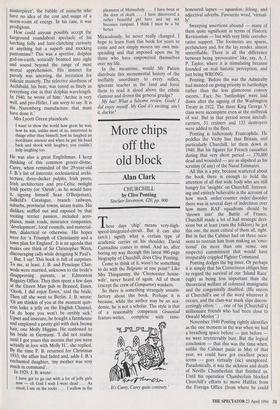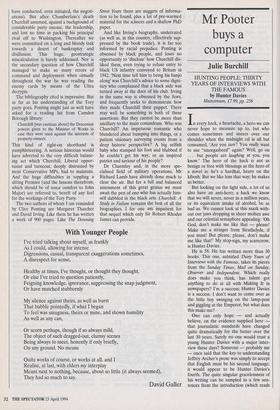More chips off the old block
Alan Clark
CHURCHILL by Clive Pouting Sinclair-Stevenson, £20, pp. 900 These days 'chip' means very-high- speed-integrated-circuit. But it can also (arch.) signify what a certain type of academic carries on his shoulder. David Cannadine comes to mind. And so, after boring my way through this latest 900-page biography of Churchill, does Clive Ponting. Come to think of it, wasn't he something to do with the Belgrano at one point? Like Mrs Thingummy, the 'Cirencester house- wife', never heard of again. All of them (except the crew of Conqueror) wankers. So there is something strangely unsatis- factory about this book. Perhaps it is because, while the author may be an aca- demic, he is not a scholar. The style is that of a reasonably competent Grauniad feature-writer, complete with time- It's Carey, Carey quite contrary.' honoured lapses — squardon, feleing, and adjectival adverbs. Favourite word, 'virtual- ly'.
Sweeping assertions abound — many of them quite significant in terms of Historic Revisionism — but with very little corrobo- rative support. The footnotes are sparse, perfunctory and, for the lay reader, almost unverifiable. There is all the difference between being 'provocative' like, say, A. J. P. Taylor, where it is stimulating because founded on real historic perception, and just being WRONG.
Ponting: 'Before the war the Admiralty had insisted on giving priority to battleships rather than the less glamorous convoy escorts.' Fact: No 'battleships' were laid down after the signing of the Washington Treaty in 1922. The three King George V class were incomplete even at the outbreak of war. But in that period seven aircraft- carriers, 51 cruisers and 133 destroyers were added to the fleet.
Ponting is ludicrously Francophile. He peddles the Vichy line that Britain, and particularly Churchill, let them down in 1940. But his figures for French casualties during that very short period — 370,000 dead and wounded — are as slipshod as his scrutiny (if any) of the Naval Estimates.
All this is a pity, because scattered about the book there is enough to hold the attention of all that wide body who are still hungry for 'insights' on Churchill. Interest- ing and entirely believable is the account of how much order/ counter order/ disorder there was in several days of indecision over how many RAF squadrons should be `thrown into' the Battle of France. Churchill made a lot of bad strategic deci- sions but at least (runs the folklore) he got this one, the most critical of them all, right. But in fact the Cabinet had on three occa- sions to restrain him from making an 'emo- tional' (in more than one sense, one suspects) commitment that would have irreparably crippled Fighter Command.
Ponting dodges the big issue. Or perhaps it is simply that his Correctness obliges him to regard the survival of our 'Island Race' (ugh) as being less important than the theoretical welfare of coloured immigrants and the congenitally disabled. (He sneers at Churchill's use of the word wherever it occurs, and the class-war mask slips discon- certingly often: . one of his [Churchill's] millionaire friends who had been close to Oswald Mosley'.) November 1940 Ponting rightly identifies as the one moment in the war when we had a breathing space before — just before we were irretrievably bust. But the logical conclusion — that this was the time when, unlike the Cabinet panic in May of that year, we could have got excellent peace terms — goes virtually (sic) unexplored. Paradoxically, it was the sickness and death of Neville Chamberlain that finished us. Until his operation Chamberlain blocked Churchill's efforts to move Halifax from the Foreign Office (from where he could have conducted, even initiated, the negoti- ations). But after Chamberlain's death Churchill assumed, against a background of considerable party unease, the leadership, and lost no time in packing his principal rival off to Washington. Thereafter we were committed on a long and bloody trek towards a desert of bankruptcy and disillusion. This huge, geostrategic miscalculation is barely addressed. Nor is the secondary question of how Churchill managed to make so many errors of command and deployment when virtually throughout the war he was reading the enemy cards by means of the Ultra decrypts.
The bibliography cited is impressive. But as far as his understanding of the Tory party goes, Ponting might just as well have asked for a reading list from Camden Borough library:
Churchill [was cautious about] the Draconian powers given to the Minister of Works in case they were used against the interests of property-owners.
This kind of right-on shorthand is pamphleteering. A serious historian would have adverted to the very difficult balanc- ing act which Churchill, Liberal oppor- tunist and turncoat, deeply distrusted by most Conservative MPs, had to maintain. And the huge difficulties in toppling a sitting Premier (and the lessons therefrom, which should be of some comfort to John Major) are referred to, bereft of any feel for the workings of the Tory Party.
The two authors of whom I am reminded by Clive Ponting are Margaret Thatcher and David Irving. Like them he has written a work of 900 pages. Like The Downing Street Years there are nuggets of informa- tion to be found, plus a lot of pre-warmed material for the scissors and a shallow PhD paper.
And like Irving's biography, underrated (as well as, in this country, effectively sup- pressed by the book trade), it is far too informed by racial prejudice. Ponting is obsessed by black people, and loses no opportunity to 'disclose' how Churchill dis- liked them, even trying to refuse entry to black US infantry convoyed to Britain in 1942. 'Next time tell him to bring his banjo along' was Churchill's advice to some digni- tary who complained that a black aide was turned away at the door of his club. Irving in the same way is obsessed by the Jews, and frequently seeks to demonstrate how they made Churchill their puppet. There may well be something in both of these assertions. But they cannot be more than ancillary to the main conundrum. Who was Churchill? An impetuous romantic who blundered about bumping into things, or a patient visionary surveying events from a deep historic perspective? A big selfish baby who stamped his foot and blubbed if he couldn't get his way, or an inspired patriot and saviour of his people?
Dr Charmley and, in the more spe- cialised field of military operations, Mr Richard Lamb have already done much to clear the air. But for a full and balanced assessment of this great genius we must await the pen of one who has actually him- self dabbled in the black arts. Churchill: A Study in Failure remains the best of all the biographies. I for one am impatient for that sequel which only Sir Robert Rhodes James can provide.



























































 Previous page
Previous page